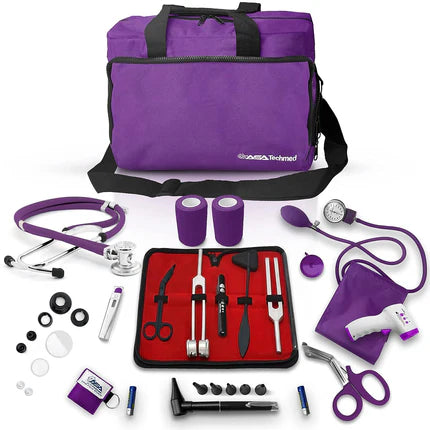As a nurse, you’re no stranger to long hours, demanding shifts, and a schedule that often feels anything but balanced. You give your all at work, caring for others, but at the end of the day (or night), you might find yourself exhausted, stressed, and with very little time for yourself. Striking a balance between your professional and personal life can seem impossible, but it’s crucial for both your mental and physical well-being.
The good news is that achieving a better work-life balance doesn’t require drastic changes. By making small adjustments to your routine and mindset, you can create more harmony in your life. Here are 15 practical work-life balance tips designed specifically for busy nurses like you.
1. Set Clear Boundaries
The first step to achieving a work-life balance is setting boundaries between work and home. When your shift ends, make a conscious effort to leave work behind. Avoid checking work emails or answering calls from work on your days off. You deserve time to recharge and focus on your personal life without the constant pull of work.
2. Plan Your Days Off in Advance
As a nurse, your schedule may be unpredictable, but that doesn’t mean you can’t plan ahead. On your days off, schedule time for activities that recharge you. Whether it’s spending time with family, engaging in hobbies, or just relaxing, having a plan ensures you make the most of your time off and avoid falling into the trap of filling your time with more work.
3. Prioritize Self-Care
Self-care isn’t a luxury—it’s essential for maintaining balance. Carve out time each day, even if it’s just 10-15 minutes, for something that nourishes your body or mind. Whether it’s a quick meditation session, a walk outside, or a bubble bath, these moments help you recharge and cope with the stress of nursing.
4. Learn to Say No
It’s easy to feel like you need to say yes to every extra shift or responsibility, but overcommitting yourself is a fast track to burnout. Practice saying no when you need to protect your time and energy. It’s okay to prioritize yourself and your well-being, even if that means turning down an opportunity at work.
5. Delegate Tasks When Possible
At work and home, don’t be afraid to delegate tasks. At work, rely on your team when appropriate; you don’t have to do everything yourself. At home, ask your family for help with household chores or meal prep. By sharing the load, you free up more time for yourself and avoid feeling overwhelmed.
6. Create a Post-Shift Routine
After a long shift, it’s important to transition from work mode to personal time. Create a simple post-shift routine that helps you decompress. This could be something as simple as taking a shower, changing into comfortable clothes, or practicing a few minutes of deep breathing. This signals to your body and mind that the workday is over.
7. Take Breaks During Your Shift
During a busy shift, it’s easy to skip breaks or eat on the go. But even short breaks can make a big difference in how you feel. Step away for a few minutes, stretch, grab a snack, and allow yourself to mentally reset. Taking breaks helps you recharge and be more focused throughout the day.
8. Practice Time Management
With a demanding job and personal responsibilities, managing your time effectively is key to achieving balance. Make a to-do list or use a planner to prioritize tasks, both at work and at home. Break your day into manageable chunks and focus on one thing at a time to avoid feeling overwhelmed by everything on your plate.
9. Set Realistic Expectations
You might not be able to do everything, and that’s okay. Set realistic expectations for yourself, both at work and in your personal life. Don’t feel pressured to be perfect all the time. It’s okay to have an off day or to let some things go when you’re feeling overwhelmed. Give yourself permission to focus on what’s most important.
10. Make Time for Exercise
Physical activity is one of the best ways to relieve stress and boost your mood. You don’t need to hit the gym for hours—a 15-20 minute walk, some yoga, or even dancing in your living room can do wonders for your mental and physical health. Schedule exercise into your day, even if it’s just a quick session, to help you stay balanced and energized.
11. Disconnect from Technology
Technology can blur the lines between work and personal life. Make it a habit to disconnect from your phone, computer, and social media, especially on your days off. Use this time to engage in activities that don’t involve screens—read a book, spend time with loved ones, or enjoy a hobby. This helps you feel more present and less tethered to work.
12. Create a Support System
Having a strong support system can make a world of difference in maintaining work-life balance. Surround yourself with people who understand the challenges of nursing and can provide emotional support when you need it. Whether it’s coworkers, friends, or family, having people to lean on can help you manage stress and find balance.
13. Use Your Vacation Days
Don’t let your vacation days go to waste! Taking time off is essential for recharging and preventing burnout. Use your vacation days to truly disconnect from work, relax, and focus on yourself. Even if you don’t have a big trip planned, taking time to rest and recharge can improve your mental and physical well-being.
14. Reflect on Your Achievements
Nursing can be stressful, and it’s easy to focus on what went wrong during a shift. Take time to reflect on your achievements—whether it’s a positive interaction with a patient, successfully completing a challenging task, or simply making it through a tough day. Celebrating your wins, no matter how small, can boost your mood and help you feel more balanced.
15. Ask for Help When You Need It
It’s important to recognize when you need help, whether it’s at work or in your personal life. If you’re feeling overwhelmed or struggling to balance everything, don’t hesitate to ask for support. Talk to your supervisor about adjusting your workload or reach out to friends and family for help with personal responsibilities. Asking for help is a sign of strength, not weakness.
Balance is Achievable
Work-life balance as a nurse may seem challenging, but it’s not impossible. By making small changes to your routine, setting boundaries, and prioritizing self-care, you can create more harmony between your work and personal life. Remember, you can’t pour from an empty cup—by taking care of yourself, you’ll be better equipped to care for your patients and enjoy life outside of work. You deserve to feel balanced, healthy, and fulfilled, both on and off the job.
Start with a few of these tips and see how they make a difference in your life. You might be surprised at how small shifts can lead to big improvements in your overall well-being.
















